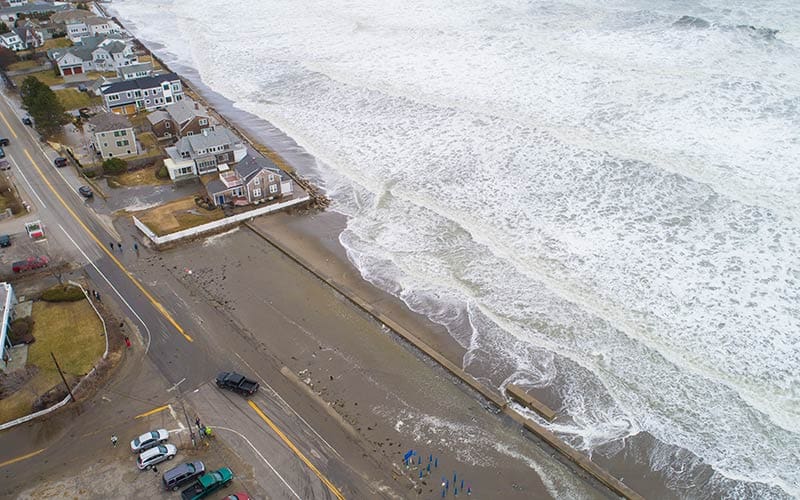
Storms and flooding are devastating communities, and states need to fund our response. Photo: EcoPhotography
Passing strong laws and building programs to protect the environment are valuable steps, but they’re useless without one key component – funding. Without a budget, the most carefully crafted, far-reaching policy is just a cool idea. With the federal government slashing funding for environmental priorities left and right, the state leaders need to step up and fund key programs. That’s why this legislative session, CLF is pushing for laws and state budgets across New England to give our environment and communities the money they desperately need.
Funding Vermont’s climate superfund
Last year, Vermont became the first state in the nation to pass a law creating a climate superfund. President Trump called it out by name in his recent executive order attacking state climate laws, so we know it’s got Big Oil scared. That’s because it forces the fossil fuel companies that drove climate change to pay to help fix the problem they created. But to ensure those companies are actually held accountable, the Vermont government needs to fund implementation of the groundbreaking law.
Before Vermont can collect money from fossil fuel companies, the government needs to tally up the costs of climate change to the state incurred from these companies’ emissions – and that takes a budget. If Vermont’s legislature doesn’t allocate sufficient money in the budget bill to implement the climate superfund, then this landmark law will stall before it’s even gotten started.
When the law passed, Vermonters made it clear that fossil fuel companies should have to pay for the damage caused by climate change, not people like you and me. Now, the legislature needs to follow through and fund this pivotal work.
Strengthening climate resiliency in Maine
Climate change is fueling extreme weather, and the costs are piling up. In recent years, increasingly severe storms and flooding have battered Maine’s residents, and home- and businessowners are left footing the bill. The winter storms of 2023 and 2024 alone caused more than $90 million in damage to public infrastructure, and millions more to private homes and businesses. That’s why passing “An Act to Increase Storm Preparedness for Maine’s Communities, Homes and Infrastructure” was a major triumph of this legislative session.
The bill, now signed into law by the governor, establishes increased funding for readying Mainers for the coming impacts of climate change. Maine residents didn’t cause climate change, and they shouldn’t be left dealing the effects on their own.
The law will set aside $15 million for homeowners to make their homes more resistant to flooding or storm damage, with priority given to lower-income residents. It also designates more than $20 million for improving the state’s ability to respond to extreme weather and flooding.
CLF championed this bill by testifying in its favor because we wanted Mainers to have the power and resources to protect themselves from dangerous weather. Funding the fight against climate change to prevent the rise of extreme weather is crucial. Funding protection from the extreme weather that’s already destroying people’s homes and savings is crucial as well.
Giving Rhode Islanders a voice in energy policy
Many crucial environmental policies don’t pass the first year that advocates and legislators propose them. A key part of successful legislative advocacy is trying again and again until a policy succeeds, using feedback to refine and improve legislation along the way. CLF is applying this principle to a Rhode Island bill that will give ordinary people a voice in major utility decisions that impact their life.
This legislative session, CLF drafted a bill to establish a fund to help community organizations pay the legal and expert witness costs required to intervene in Public Utilities Commission and Energy Facilities Siting Board proceedings. In Rhode Island, the Public Utilities Commission and Energy Facilities Siting Board oversee major decisions around utilities and large energy facilities like power plants. You might not be familiar with these arms of the government, but if you pay for electricity, water, and gas, or care whether or not a power plant is placed in your backyard, their choices impact you.
After feedback, workshopping, and reaching out to contacts in the state government, we concluded the timing wasn’t right for this bill to move forward this session – but that doesn’t mean we’re giving up. Feedback from state agencies and public testimony revealed ways we can strengthen this bill and increase its chances of passing in the future. CLF plans on resubmitting an improved version of this bill next year.
Legislative advocacy is a slow, iterative process. Tenacity is vital. It’s unfair that barriers like the costs of hiring expert witnesses make it harder for lower income communities to speak up in utility proceedings that affect them. CLF will keep fighting to give a voice to people and groups who have historically been blocked from the process, even if it requires years of work.
We need to do more to fund environmental projects and priorities across the region. This is the time to accelerate our investment in a cleaner, cooler, greener planet, not pull back. This legislative session, New England states have the opportunity to step up in the federal government’s leadership void. We don’t have to let federal neglect lead to local inaction. CLF is determined to fill the gap and push states to fund environmental priorities here at home.



